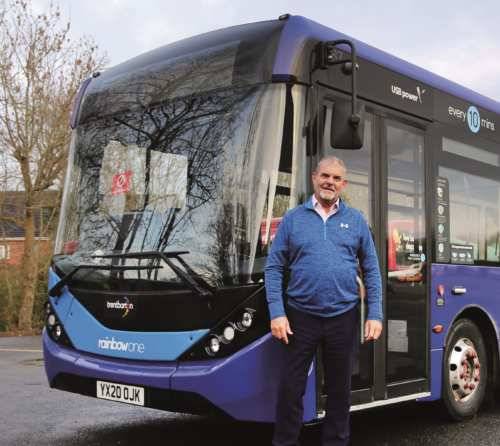
The new taskforce has been convened by the CPT to address the challenges that rural services face when it comes to decarbonisation
A new taskforce to help rural bus services smoothly and sustainably transition to zero-emission technologies has been convened by the Confederation of Passenger Transport (CPT). Without a clear roadmap to help operators decarbonise longer distance services in more remote areas and the end of sale date for diesel buses not yet confirmed, the CPT is highlighting the need for action by bringing together industry leaders as part of a new Rural Zero Emission Buses Taskforce (RZEBT).
Despite investment over the last eight years of more than £2bn in Euro VI and green bus technology and the Government’s ZEBRA scheme, which has leveraged an additional £233m from the private sector, there are still challenges such as the current range of electric batteries and a lack of refueling and charging points on roads and in depots, which CPT says pose a significant challenge to operators in running longer distance zero emission vehicles across rural communities.
Chair of the Rural Zero Emission Buses Taskforce and former MD of Trentbarton and Kinchbus Jeff Counsell said: “I am delighted to be chairing this new, forward looking taskforce, established to help our rural bus services overcome the challenges to transitioning to zero emission vehicles. The road to zero presents many obstacles for all bus operators, however due to the extended range and topography of routes, our rural services face even greater challenges.
“I look forward to working with stakeholders from across the bus, infrastructure and energy sectors to name a few, to develop a strategy that will ensure our rural services can transition sustainably to zero emission technologies and continue to provide the valuable service for passengers in more remote areas.”
CPT’s Policy Manager Becki Kite added: “Long distance rural bus services are vital for connecting passengers in more remote areas to work, leisure, education, and medical appointments. To help deliver a sustainable, fully funded, and long-term roadmap for operators in rural areas, CPT has set up a Rural Zero Bus Emission Taskforce with industry stakeholders and government to create a springboard of positive action. We are encouraging all interested stakeholders from operators, local transport authorities, DfT, energy and infrastructure providers who want to drive forward a better approach to rural bus service decarbonisation to sign up to the Taskforce.”
The first meeting of the RZEBT took place on 29 June. Over the coming months, the Taskforce will explore the decarbonisation challenges in rural areas. Using an evidence-based approach, it will then identify potential solutions to help operators overcome them. The CPT is inviting expert stakeholders to support the work of the Taskforce, which will involve bus operators, local transport authorities, DfT, energy and infrastructure providers.

